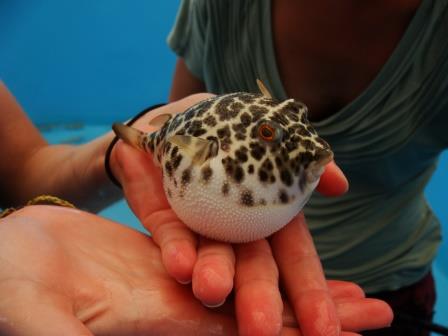Do animals have personality? If so, how do we define and measure it? How would personality types affect an animal’s fitness?
Researchers define “animal personality” as structured differences in the behavior of individual animals across time and context. They have observed a variety of personalities in animals such as shyness and boldness, exploration and avoidance, and activity . These individual differences may affect how animals interact with each other and their environment.
Naomi Pleizier, an MSc. student from the Cooke Lab at Carleton University, Ottawa, Canada, returned to CEI this January to study the effects of short-term stress on the personality of checkered puffer fish (Sphoeroides testudineus). Living in the ever-changing mangrove ecosystem, checkered puffers thrive despite challenges such as large shifts in salinity and temperature. True to their name, puffers have also developed an unusual defense against potential predators – filling their bodies with air or water to puff up to a surprising size. Despite the resilience of these fish, additional stressors, such as climate change and the destruction of mangrove habitat, may affect their behavior (including personality) and health.
 Naomi and her team from Carleton and CEI collected puffers from Page Creek and tested their behavior before, during, and after treating them with a stress hormone, cortisol. Behaviors tested included puffing, activity, and fright response. The puffers were returned to Page Creek and will be caught again in the few days to be sampled in order to measure the activity of their immune systems. With these results, the team will be able to determine how personality differs between puffers and how this personality, as well as immune function, is influenced by an increase in cortisol levels.
Naomi and her team from Carleton and CEI collected puffers from Page Creek and tested their behavior before, during, and after treating them with a stress hormone, cortisol. Behaviors tested included puffing, activity, and fright response. The puffers were returned to Page Creek and will be caught again in the few days to be sampled in order to measure the activity of their immune systems. With these results, the team will be able to determine how personality differs between puffers and how this personality, as well as immune function, is influenced by an increase in cortisol levels.